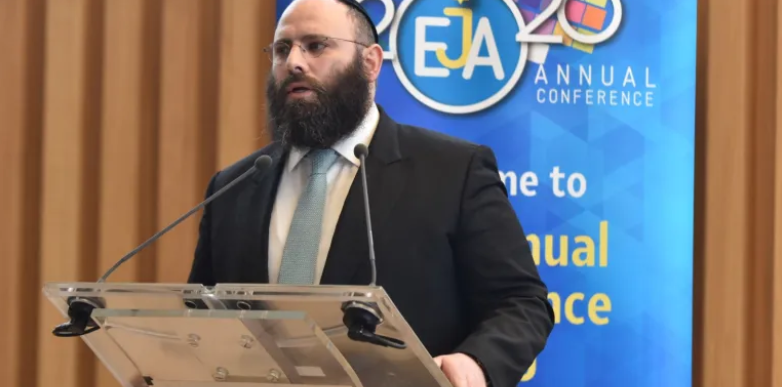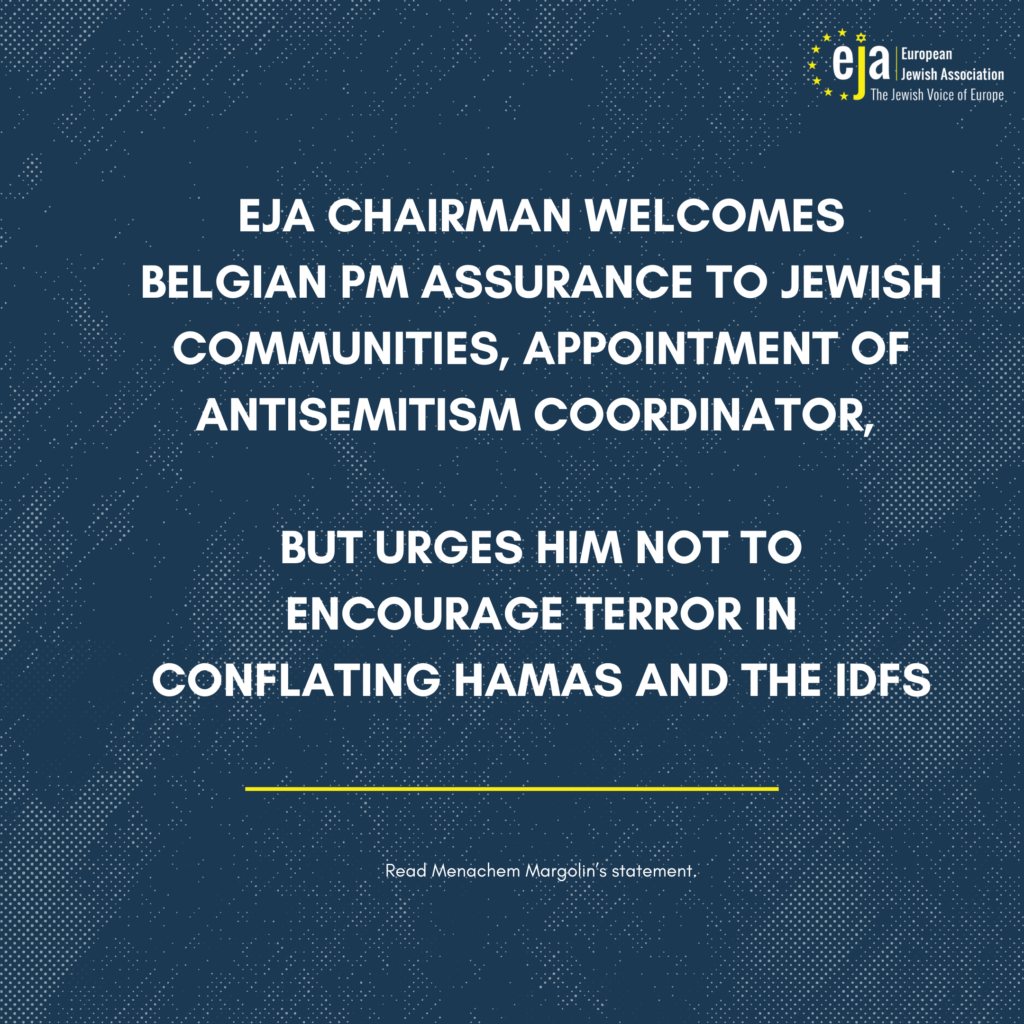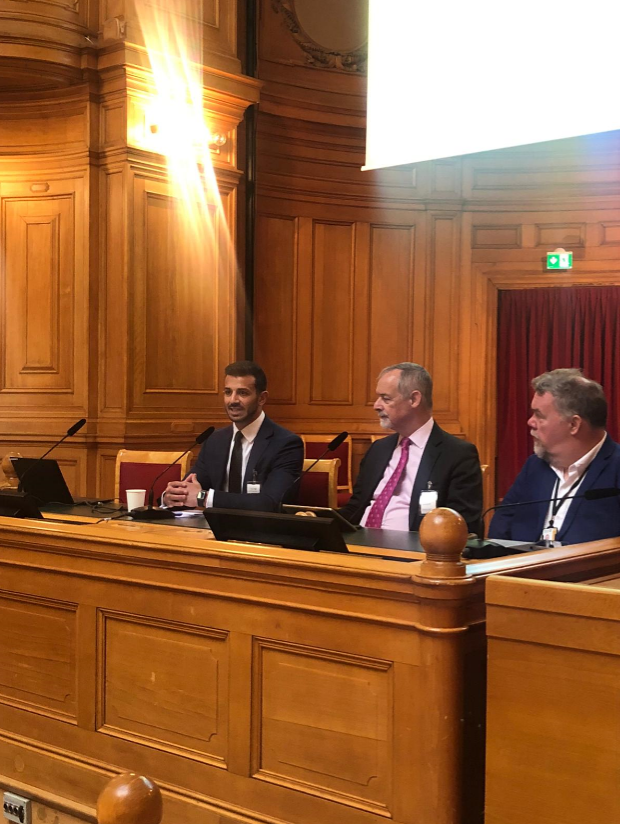UANI and European Jewish Association Co-Host Event at Sveriges Riksdag to Expose Iranian Regime's Presence in Sweden
In a significant collaborative effort, United Against Nuclear Iran (UANI) and The European Jewish Association joined forces to host a pivotal event within the esteemed halls of the Sveriges Riksdag in Stockholm. This event served as a platform to unveil the findings of UANI’s extensive investigation into the Iranian regime’s infiltration within Sweden.
Attendees gathered with a shared commitment to shed light on the presence and activities of the Iranian regime within Swedish borders. The event brought together influential figures from diplomatic circles, government officials, advocacy groups, and concerned citizens, all united in their determination to address this pressing issue.
Throughout the event, speakers highlighted the alarming implications of the Iranian regime’s infiltration, emphasising the need for vigilance and coordinated action. They underscored the importance of raising awareness and implementing strategies to counter such interference, safeguarding Sweden’s sovereignty and security.
With the spotlight firmly on the findings of UANI’s investigation, attendees gained valuable insights into the extent and methods of the Iranian regime’s presence in Sweden. This comprehensive analysis provided a crucial foundation for informed discourse and strategic planning moving forward.
As the event concluded, participants departed with a renewed sense of purpose and resolve. Armed with knowledge and collaboration, they stood ready to confront the challenges posed by the Iranian regime’s infiltration, safeguarding Sweden’s interests and upholding the principles of democracy, security, and sovereignty.
- May 7, 2024

European Jewish leader on increase of antisemitism in Belgium: ‘It’s time for action and it’s no longer possible to be satisfied with statements’
He called on the Prime Minister ‘’to come to his senses and show leadership that goes beyond narrow political consideration.’’Belgium’s Prime Minister Alexander De Croo’s pledge to enhance security measures to protect the Jewish community in the country is a matter of satisfaction ”but in view of the waves of hatred and anti-Semitism dring pro-Palestinian demonstrations in the streets of Brussels and on campuses it is time for action and it is no longer possible to be satisfied with statements,’’ said Rabbi Margolin, Chairman of the European Jewish Association.In a response to Jewish leaders who had expressed their deep concern regarding Croo’s’’hostility’’ towards Israel and its consequences on the Jewish community, the Prime Minister reaffirmed that anti-Semitism remains condemnable in all circumstances and said he takes the increase in anti-Semitic acts in Belgium and elsewhere very seriously.’’ ‘’ The country has stepped up security measures to protect the Jewish community,’’ he added.Rabbi Margolin also welcomed De Croo’s announcement that he is in favor of appointing an independent national coordinator for combating antisemitism, a demand made by the European Jewish Association for years.
However, Rabbi Margolin pointed out that in view of the waves of hatred and anti-Semitism dring pro-Palestinian demonstrations in the streets of Brussels and on campuses in Ghent and Leuven, ‘’it is time for action and it is no longer possible to be satisfied with statements.’’‘’The confusion between the Hamas terrorists who kill old men, rape young women and decapitate babies and the army that tries to fight them is not only problematic for Israel but is a harbinger for the extremists here on our streets,’’ said Margolin;He continued, ‘’A leader who does not understand this ignores a very tangible danger that is already blackening in the present for Belgian society and its citizens. If at the beginning of the war in Gaza there were those who said that the West was next in line, now, in view of the inaction of leaders in Europe, terrorism is already here.’’Rabbi Margolin concluded by saying that ‘’whoever thinks that this is only against Jews should read the brazen threats of the “student” organizations in Ghent, calling on the Belgian Prime Minister ‘’to come to his senses and show leadership that goes beyond narrow political consideration.’’The European Jewish Association initiates and coordinates the activities of dozens of Jewish organizations to combat anti-Semitism and for freedom of religion and worship in Europe.The organization, which defines itself as the “Jewish voice of Europe,” holds conferences to raise awareness of the Holocaust and its lessons for EU leaders.
Link: https://ejpress.org/european-jewish-leader-on-increase-of-antisemitism-in-belgium-its-time-for-action-and-its-no-longer-possible-to-be-satisfied-with-statements/
- May 6, 2024

EJA Chairman Hails Belgian PM's Commitment to Jewish Communities and Antisemitism Efforts, Cautions Against Equating Hamas with IDF
Statement from EJA Chairman – Belgian Prime Ministerial response to principal Jewish Associations in Belgium
The chairman of the European Jewish Association Rabbi Menachem welcomed the assurance from Belgian Prime Minister Alexander De Croo that he has taken seriously the increase in antisemitic acts in Belgium and elsewhere and pledging enhanced security measures to protect the Jewish community in the country. The EJA Chairman also welcomed the announcement that the Prime Minister is supporting the appointment of an independent national co-ordinator for combatting antisemitism.
However, Rabbi Margolin points out that, in light of the waves of hatred and antisemitism, particularly on the streets of Brussels and on campus in Ghent, it is time for action that Jews can no longer be satisfied with statements alone.
The confusion in distinguishing between Hamas terrorists who kill old men, rape young women and decapitate babies, and the army that tries to fight them is not only problematic for Israel but is an encouraging harbinger for the extremists here on our own streets.
A leader who does not understand this ignores a very tangible danger towards Belgian society and its citizens. If at the beginning of the war in Gaza there were those who said that the West was next in line, now, in view of the inaction of leaders in Europe – one can state that terrorism is already here.
Rabbi Margolin finally called on the Prime Minister to come to his senses, address this threat and show the kind of leadership that is devoid of narrow political considerations.
- May 6, 2024

Eurovision song contest in Malmo: Israel’s National Security Council upgrades travel warning for the Swedish city
Link: https://ejpress.org/eurovision-song-contest-in-malmo-israels-national-security-council-upgrades-travel-warning-for-the-swedish-city-mo-sweden/
- May 3, 2024

Belgian university maintains collaboration with Israeli institutions despite protests demanding to cut ties
About twenty demonstrators protested Thursday in front of the rector’s office at Leuven University (KUL) in Belgium on Thursday to demand that the university immediately end its collaboration with Israeli institutions. But the university said it has decided to maintain current collaboration with its Israeli partners, daily La Libre reported.
Participants at the protest action waved Palestinian flags and wore black and white scarves. They chanted slogans such as “Shame on KUL, break up with Israel”, “Free Palestine” and “Stop the genocide”.
Several actions have already taken place in recent months to denounce the links between Israeli universities and KU Leuven. “We have the impression that the University of Leuven will not put an end to these collaborations,” a protester was quoted as saying. “That’s why we’re keeping up the pressure: links with institutions linked to the arms industry and the Israeli security apparatus are extremely problematic,” he added.
The rector of KU Leuven, Luc Sels, will receive some of the protesters to discuss the issue next Tuesday but the university said that it has decided to maintain its current research projects with various Israeli universities, following a decision taken on by the relevant ethics committee.
The university has “thoroughly evaluated” the current collaborations, particularly on the basis of human rights. “The general position is one of restraint”, the Rector wrote on his blog.
The leuven university has no structural links with Israeli universities, but does have project-based collaborations. These involve some fifteen projects, mostly in larger consortia funded by the European Horizon research program.
“The content of each project was thoroughly examined: it was checked whether there was any risk of the content being misused or used for military purposes,” Luc Sels said.
“The projects were also assessed to determine whether they presented a risk of human rights violations and whether the partners were not involved in human rights violations,’’ he added.
He continued: ‘’On the basis of this screening, it was decided to continue with the current projects. “We are opting for a balanced, fine-tuned approach. New collaborations with Israeli partners must first be submitted to the ethics committee for assessment. The committee not only applies human rights criteria but will also assess with the necessary rigor whether the research has possible military applications.’’
At another Belgian university in Ghent, an association titled ‘’Students4Palestine’’ also called on the Board of Governors and Rector to cut all collaborations with Israeli institutions which they accused of being ”complicit in the ongoing ethnic cleansing of Palestinians.’’ They are threatening to occupy the University if their demand is not met.
Last November, Ghent University issued a clear statement saying that it always decides to cooperate with partners, universities or companies and not with countries as such.’’ ‘’Within the framework of our human rights policy, it is therefore actual our potential partners we assess and not the country in which they are located,’’ the statement said.
- May 3, 2024

EIPA Hosts Press Briefing with Israeli Minister Amidst EU Talks on Middle East Crisis
Our EIPA colleagues hosted a press briefing in Brussels featuring Israeli Knesset Minister of Diaspora Affairs and Combating Antisemitism, Amichai Chikli, amidst EU leaders’ discussions on the Middle East situation post Iran’s unprecedented drone and missile strikes on Israel. Journalists from Deutsche Welle, POLITICO, and RADIO JUDAÏCA had the chance to pose pivotal questions to Chikli during the session at our Brussels office.
Amichai Chikli, born in 1981 in Jerusalem, serves as Israel’s Minister of Diaspora Affairs and Combating Antisemitism. He holds degrees from University of Haifa and Tel Aviv University. Chikli founded the Tavor Leadership Academy, focusing on nurturing Zionist leaders.
He initiated a preparatory program for Israel Defense Forces service for immigrants and volunteers. Initially with Yemina, he later joined Likud and was elected to the Knesset.
Chikli advocates integrating Jewish and Israeli identities, emphasizing their significance for Jewish continuity and Israel’s social resilience. He champions conservative values, aiming to unite nationalist and Zionist principles with economic and social policies.
- April 17, 2024


